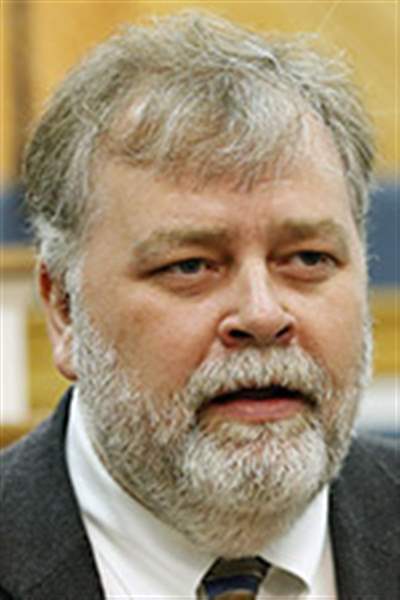
TARTA exec says tokens likely to stay
Says social services groups’ desire justifies the expense
5/13/2015
Gee
THE BLADE
Buy This Image

Gee
TARTA’s top administrator retreated Tuesday from plans to end sales of bus tokens as part of a fare-increase plan, a decision that representatives of several social-service agencies cheered during the first of two hearings about the plan.

While speakers still asked the Toledo Area Regional Transit Authority to reconsider its proposal to boost fares by about 25 percent, General Manager James Gee said the alternative is service cuts that would be at least as painful for riders.
“The rate increase is not set in stone, but we’re looking at an ugly, ugly budget without it,” Mr. Gee told about 50 people in the meeting room at Toledo Area Regional Paratransit Service headquarters on Knapp Street during the lunchtime hearing. “Our service is pretty lean as it is. Hurting service is probably worse for customers now than raising fares.”
A dozen people attended an evening session.
The proposal calls for TARTA’s base bus fare, now lowest among urban Ohio transit systems at $1, to rise to $1.25, its paratransit fare to rise from $2 to $2.50, and all other fares and pass prices to increase by about 25 percent.
In announcing the proposal in late March, Mr. Gee said he would recommend elimination of bus tokens, now sold in rolls of 25 for $22.50, or a 10 percent discount off full fare.
Tokens, he said at the time, account for only about 6 percent of TARTA trips, and programming new fareboxes to be installed in authority buses next year to accept “specialty coins” would cost extra.
But on Tuesday, the transit manager said the strong desire among social-service agencies that distribute bus tokens to clients justifies the additional farebox expense. Mr. Gee said he did not know exactly how much that expense will be.
Representatives of the Re-entry Coalition of Northwest Ohio, which assists former prison inmates in re-acclimating to community life, were among those who said they had attended to plead for retaining tokens. They said tokens are easy to distribute and use, and thanked Mr. Gee for his decision.
Lisa Stewart, a wellness specialist at the Thomas M. Wernert Center, said tokens also are convenient for mental-health clients who already need detailed training just to ride the bus by themselves and “may not have the skills to transition from a token system to a [fare-] card system.”
But many, including Karen Wu, a lawyer with Advocates for Basic Legal Equality, also urged the transit authority to find a way to mitigate the hardship a fare increase will cause for poor people.
“This disproportionately affects people with low incomes. They don’t own cars. That’s why they use TARTA,” Ms. Wu said before suggesting the transit authority look into establishing a fare discount for riders who can somehow be qualified as low-income.
Veronica Murphy, a member of the boards of RCNO and the Bethany House women’s shelter, said a 25-percent fare increase would be “really very detrimental” to the homeless and needy as well as agencies that serve them, because “it takes money out of other budgetary areas.”
“We have struggled to make it nine years” without a fare increase, Mr. Gee responded. “Any time we touch the fares, it hurts people. Any time we cut the service, it hurts people.”

Mr. Gee laid much of the blame for TARTA’s financial needs on state government, noting Ohio now spends 63 cents per person annually on public transportation, ranking it 37th among all states, just below South Dakota and far below such neighboring states as Michigan ($24.33), Illinois ($63.26), and Pennsylvania ($85.55).
He also said that while “vitally needed,” the transit authority’s paratransit service for people whose disabilities limit their ability to ride regular bus service amounts to an “unfunded mandate” from the federal government.
Mike Ferner, a former Toledo city councilman and mayoral candidate, said he could support the fare increases as long as the TARTA board blames military spending for under-funding of public services like transit.
The fare plan is not related to the transit authority’s proposal to consolidate its five-stop bus loop in downtown Toledo into a single, central bus station, Mr. Gee said in response to a question.
If implemented, the plan would reduce TARTA’s operating expenses, but the new bus station would be built mostly using federal funds.
Were service to be cut, he said, it would probably be “at the edges,” affecting early morning and late evening trips on the weekdays and possibly elimination of holiday or even Sunday service.
TARTA now operates between 5 a.m. and 11:30 p.m. weekdays; 6 a.m. and 9:45 p.m. Saturdays; 7 a.m. and 7 p.m. Sundays, and 7 a.m. and 2:30 p.m. on six major holidays.
Along with the two hearings, the transit authority will accept written or telephoned comments about the fare plan through May 19, Mr. Gee said.
The proposal is to be reviewed during a finance committee meeting May 28, then will be up for a vote by the full board of trustees on June 4. The board meeting will start at 8 a.m. in the TARPS meeting room.
Contact David Patch at: dpatch@theblade.com or 419-724-6094.